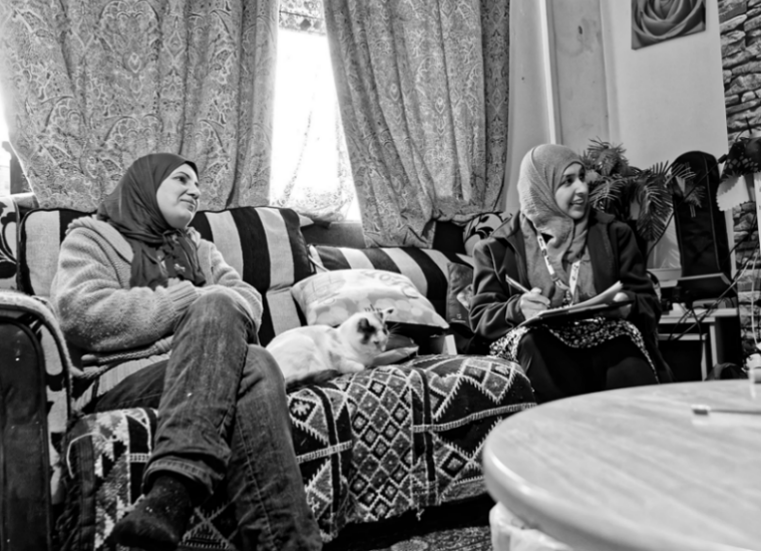Inclusive innovation: using community co-innovation to tackle health inequalities and digital exclusion

By Fran Ward, Project Manager, NHS Arden & GEM CSU and Dr Paulina Ramirez, Academic, Birmingham Business School.
Digitalisation of the NHS has the potential to enable more personalised care and improve health outcomes. But it can also widen health inequalities. Some people in communities facing social and economic deprivation, which are also those experiencing the poorest health, find accessing care increasingly difficult as the NHS becomes more digital.
If those most in need of health services become less able to access them, health outcomes for these communities will worsen and the overall cost of healthcare will increase. Integrated care systems (ICSs), therefore, need to maximise the value of their investment in digitalisation by making it work for all their communities, not just the ones they know and understand well.
The ‘Building Inclusive Digital Health Innovation Ecosystems’ research programme, led by University of Birmingham’s Business School and supported by NHS Arden & GEM’s digital transformation team and Walsall Housing Group (whg), explores how community co-innovation could be used to develop digital healthcare that works for diverse communities and reduces the risk of exclusion.
Co-innovation is about understanding and framing problems and taking a bottom-up approach to generating new ideas in response. Specifically, this programme of community co-innovation is socially inclusive by design, creating an opportunity for disadvantaged communities to share their knowledge and lived experience. It gives these communities an equal share of voice alongside commissioners, clinicians and other stakeholders in the development of new digital health technologies or design of new online services.
Peer research
To genuinely hear what more deprived communities need, it is important to rethink how we in the NHS structure engagement to make it easier and more comfortable for those we most want to hear from. Training peer researchers from whg and local voluntary organisations enabled us to build on existing skills, connections and relationships. As trusted members of the community, peer researchers were better able to have relevant conversations within people’s homes, and elicit more honest and open responses on how people access technology and the barriers they face.
The resulting insights challenged some assumptions around barriers to adoption of digital technologies. The main source of inequality was found to be the lack of skills and confidence to engage with online services, with an individual’s type of work or family support structure often having a greater influence on digital proficiency than age, for example. Concerns around data privacy and information sharing were high, causing some not to access potentially valuable support. Despite positive attitudes towards digital in general, many felt digital services such as online GP appointments were not an adequate replacement for face-to-face health services due to a combination of trust, complexity and importance of healthcare in people’s lives.
Simply developing more digital services without addressing these fundamental barriers is inevitably going to limit success.
Changing the nature of engagement
Although good examples of user engagement in digital health services exist, there are constraints too. In particular, technology companies often have little or no engagement with deprived communities so can’t be sure their technology will work for those most likely to have the highest health needs. Alongside peer research, we need to create spaces for co-innovation to happen, bringing together these stakeholders to share information and work together to come up with new ideas.
A locally hosted co-innovation event enabled system partners in the Black Country ICS and health technology companies to hear from and engage with peer researchers and other local community organisations to start putting theory into action. Based on health priorities identified through the peer research, table group discussions addressed challenges such as how to ensure that a mental health app was used by those who most needed it, and how to increase numbers of patients from areas of high deprivation attending diabetes reviews. Peer researchers were able to articulate the day-to-day challenges people in their communities face and why, for example, simplicity and ease of use is often preferable to feature-packed, complex apps.
The event has already resulted in a dedicated task and finish group being set up at NHS Black Country Integrated Care Board to explore how community co-innovation can be applied to issues such as digital GP access. Whg is also keen to continue building a space for co-innovation within its community. More broadly, however, there is a wealth of learning from this approach which can be applied to digital transformation across the country.
Developing best practice
It is clear from this work that input from communities facing social and economic deprivation is essential in finding solutions to some of the nation’s most complex health challenges – and that how we do that is as important as why.
Findings from the ‘Building Inclusive Digital Health Innovation Ecosystems’ research have been used to develop a What good looks like for our communities report to support the NHS Digitalisation Framework. This highlights the need for affordable, simple, safe and inclusive technology that is well integrated with in-person services, guarantees data privacy and is supported with local skills training and support.
We have also developed a playbook to guide ICSs in using community co-innovation to develop digital health services, drawing on the learning from this programme to encourage greater use of this approach across the NHS. After all, there is no point in developing digital services that aren’t going to work for the communities we most need to help.
Photo caption: Peer researchers interviewing community members in their own homes in Walsall.
To find out more about digital inclusion and health inequalities, see: The digital divide: Reducing inequalities for better, prepared by Public Policy Projects.